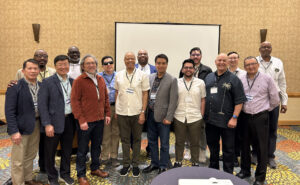
COLORADO SPRINGS, Colo. (BP)–An article in the June 2001 issue of Focus on the Family’s Citizen magazine leads with the question, “When you drop your offering in the collection plate on Sunday, do you expect that you’re helping to silence school prayer, oppose government aid to abstinence programs and fight the ‘religious right?'” Writer Matt Kaufman’s two-page analysis of the Baptist Joint Committee on Public Affairs utilizes research by Southern Baptist layman Roger Moran of Missouri into the BJC, a church-state issues organization funded by a handful of Baptist state conventions and other Baptist groups.
Moran’s research, which church study committees have tapped in examining the BJC and the growing influence of the SBC-breakaway Cooperative Baptist Fellowship, is in the spotlight beyond Citizen magazine. Recent articles in the Baptist Standard, a publication of the Baptist General Convention of Texas, accuse churches of being swayed by Moran’s influence when deciding to withdraw from the BGCT. And an upcoming mailing by the Texas Baptist Laymen’s Association to 5,000 Southern Baptist churches across Texas also will utilize Moran’s findings.
The Citizen magazine article, written for a broader evangelical audience, recounts the Southern Baptist Convention’s end to its relationship with the BJC in the early 1990s and also describes the efforts of an American Baptist layman in opposing his denomination’s funding of the Baptist Joint Committee. Kaufman points to the discrepancy between the BJC’s stated commitment to “defend and extend God-given religious liberty for all, bringing a unique Baptist witness to the principle that religion must be freely exercised, neither advanced nor hindered by the government” and the close relationship between the BJC and various organizations which advocate abortion and special rights for homosexuals.
The Citizen article notes the association of BJC leaders with such organizations as Americans United for Separation of Church and State and People for the American Way. Kaufman observes that former BJC leader James Dunn “railed frequently against the ‘radical religious right,'” which he described as “‘a bunch of crazies — people like Gary Bauer, James Dobson, Jerry Falwell and the Moral Majority types.'”
The Baptist General Convention of Texas joined the BJC as a formal member body last fall, with Charles Wade, BGCT executive director, Phil Strickland, director of Texas Baptists’ Christian Life Commission, joining the BJC’s board, along with Albert Reyes, president of the Hispanic Baptist Theological School in San Antonio.
BJC board member W.B. Tichenor’s defense of the BJC is presented in the article in contrast to the criticism offered by Moran, research director of the Missouri Baptist Laymen’s Organization and a member of the SBC Executive Committee.
The Citizen article notes, “For their part, BJC leaders say they’ve gotten a bum rap. They say Dunn and others pursued their political activism on their own time and that the organization itself scrupulously sticks to church-state issues.” Kaufman tells of Tichenor writing Baptist pastors and laymen to clarify that BJC steers clear of issues like abortion and homosexuality.
Using Moran’s research, Kaufman points to BJC’s contribution to a 252-page manual, titled “How to Win: A Practical Guide to Defeating the Radical Right in Your Community.” Tichenor defends BJC staff involvement in the project as being limited to church-state issues. Other contributors included the National Abortion Federation, Planned Parenthood, the National Gay and Lesbian Task Force, as well as Penthouse International, Kaufman writes.
Kaufman quotes Moran as rejecting Tichenor’s argument. “They’re embracing some of the most far-left groups in American politics and lending them the credibility of the Baptist name,” Moran tells the magazine.
Verifying the associations of groups like the BJC and the Cooperative Baptist Fellowship with left-wing religious and political organizations is the focus of Moran’s extensive research base. Citizen magazine refers readers to the Missouri Baptist Laymen’s Association website at www.mbla.org for further details relating to BJC.
Moran’s attention to the connections of moderate Baptists in Texas is reprinted in the upcoming Texas Baptist Laymen’s Association mailing. Director William G. Streich of Wichita Falls explains his purpose in using Moran’s material, stating, “TBLA believes that God will honor missions in Texas as Texas Baptists not only hold to biblical positions, but as they refuse to partner with those who tolerate, accommodate, and/or embrace theological, social and moral liberalism.”
Accusations against Moran were the focus of a six-part series by Mark Wingfield, managing editor of the Texas Baptist Standard, last year. “Critics of Moran’s research often claim he peddles guilt by association, that the concerns he raises are based on little more than Person A serving on a board with Person B, who happens to support homosexual rights, and therefore Person A must support homosexual rights,” Wingfield wrote. CBF supporters are quoted to criticize Moran’s research style as “unbiblical” and “lacking integrity.”
The BGCT Committee on Baptist Integrity began meeting in 1999 to counter the analysis in Moran’s publications and other writings that they described as “misleading and slanderous attacks” on the BGCT. Last year the committee called the literature and other pieces like it “malicious gossip” and urged churches not to distribute it.
CBF Coordinator Dan Vestal accused Moran of “misleading and untrue statements” in his MBLA publications and videos, demanding both a retraction and a formal public apology. Moran asked Vestal to cite examples of factual errors and received no response other than an open letter issued by CBF criticizing the research.
“The purpose of every partnership is to network, empower and mobilize Baptist Christians and churches for effective missions and ministry in the name of Christ,” Vestal wrote. “That is our mission. That is our ‘agenda’ — nothing more, nothing less, nothing else.”
In another Baptist Standard article by Wingfield, he turns to a Dallas lawyer to raise the concern that churches distributing MBLA and TBLA literature could be sued for defamation or libel. Urging caution on the part of churches, attorney Paul Watler is quoted as saying, “As someone who has practiced defamation law for almost 20 years now, I’ve seen libel and defamation cases brought over a lot less.” Watler added, “The expense and distraction and burden of defending litigation is very real.”
Church and state assistant professor Michael Whitehead of Midwestern Baptist Theological Seminary observes, “It seems like nobody disputes the facts stated by Roger Moran. Some people just disagree with his opinions.” As an experienced attorney dealing with religious issues, Whitehead said, “One may disagree with Mr. Moran’s opinions, but careful lawyers would not call them slanderous.”
He added, “The opinion that birds of a feather flock together is not slander. If the critics want to dispute this opinion, they should show facts to prove they have stopped flocking together with questionable birds. But they keep on flocking, and keep on complaining about guilt-by-association charges. If you’re not guilty, then you may want to stop associating with the guilty.”
Noting that slander or libel must involve false statements of fact, Whitehead said he would not fear legal liability for making Moran’s articles available to Southern Baptists interested in doctrinal and moral issues. “Truth is always a defense to slander charges,” Whitehead added, noting that Moran has invited critics to prove his facts are false. “Critics, it seems, never respond with facts, but only argue with Mr. Moran’s conclusions.”
While Wingfield received a first place award from the Baptist Communicators Association for investigative reporting, Moran challenged the award from the standpoint of Wingfield’s writing bias.
Wingfield’s articles “attempted to downplay the legitimacy of the concerns and defended BGCT leaders’ involvement in CBF,” Moran said, “rather than [being] an honest attempt to address legitimate concerns raised by MBLA about the liberalism that permeates CBF.” To counter the Baptist Standard’s criticism of the 12-page MBLA publication on the BJC, the MBLA website carries a 59-page defense of the research.
One of the key Texas Baptist leaders defended by the Baptist Standard was David Currie, coordinator of Texas Baptists Committed. “Currie’s organization is unapologetically political and is given the lion’s share of credit for moving the BGCT away from its historic partnership with the SBC and towards ‘partnering’ with the CBF,” Moran answers.
He documents Currie’s direction of the National Network of Mainstream Baptists focused largely on opposing the Southern Baptist Convention, as well as an appeal last year for the BGCT to “divest” itself of SBC money, particularly the $1.4 million in annual funding by the SBC’s North American Mission Board. (A May 4 recommendation by a BGCT missions committee seeks reduced funding of NAMB by $1.28 million.)
Moran also points to Currie’s leadership with a pro-homosexuality religious organization, The Interfaith Alliance, and counters the Baptist Standard’s claim that homosexuality is not a part of the group’s agenda. “A brief look at The Interfaith Alliance’s commitment to pro-homosexual activism since 1997 when Dr. Currie came to the group’s board of directors shows a very different TIA than the one portrayed by Dr. Currie and the Texas Baptist Standard.”
Acknowledging that Wingfield won an award for his reporting, Moran said Wingfield failed to uncover information describing The Interfaith Alliance’s advocacy of pro-homosexual federal legislation and participation with the National Religious Leadership Roundtable co-convened by Equal Partners in Faith and a division of the National Gay and Lesbian Task Force.
The attention given to Moran’s work by the widely distributed Citizen magazine will draw even more readers to his detailed documentation. His references to groups like the Cooperative Baptist Fellowship, Mainstream Baptists, Baptist Women in Ministry and the Alliance of Baptists include links to their websites. And their association with leaders of Americans United for Separation of Church and State, People for the American Way, The Interfaith Alliance, Progressive Religious Partnership and American Civil Liberties Union give Moran reason to link his research to the media coverage and websites of those groups.
An April 23 Baptist Standard article claimed that the spread of “lies” is instrumental in persuading Texas Baptist churches to break ties with the BGCT to join the pro-SBC Southern Baptists of Texas Convention. The coordinator of BGCT’s “rapid-response team” urged “churches that are being led astray with false information about BGCT and its institutions” to check sources in order to confirm the information for themselves.
Concerned Southern Baptists drawn to Moran’s website by the Citizen article have ample opportunity to verify the information, as he provides extensive footnoting and direct links to documentation. In his article addressing the historical context of controversy in the SBC, Moran speaks to individuals and churches involved in denominational studies. The website’s purpose, he notes, “is to better inform those who find themselves asking, ‘What was the controversy in the Southern Baptist Convention about?’ ‘What are the differences between the SBC and the CBF?’ and ‘Does it really matter which way my church goes?'”
Moran said he devotes his times to continued research and publishing because state Baptist papers have refused to print the information he’s uncovered. “We believe Baptists do indeed have a right to know and should hear the conservative side. Churches have a right to know what’s going on behind the scenes and when they know the truth, what they do then is up to them.”
Moran urges Baptists to do their own research, advising, “Make sure what I’m saying is true, accurate and in context.”
–30–
















